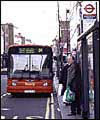| Present perfect: simple and continuous |
 |
||||||
| J.
Schockaert from Belgium asks: Could you please tell me:
|
| Roger replies: | ||
|
present perfect simple Both
the present perfect simple and the present perfect continuous
relate a past action to the present, but the present perfect
simple suggests a completed action and focuses more on achievements
and results. Consider the following:
|
||||
|
present perfect continuous When
we use the present perfect continuous, however, there is
usually a suggestion that the activity is not yet completed, or
we wish to emphasise the length of time it has lasted or stress
the continuous, on-going nature of the activity. The present perfect
continuous is often used in conjunction with for or since
phrases. Consider the following:
|
||||
|
present perfect continuous vs present perfect simple Whether
teaching or learning the present perfect, it is often useful to
present the two verb aspects in a contrastive way. Compare the following:
|
||||
|
present perfect vs past verb forms Whether teaching or learning the present perfect, it may also be useful to compare it with past forms where the focus of attention is on a point or period in the past.
present perfect continuous: has ('s) / have ('ve) + been + ing present perfect simple: has ('s) / have ('ve) + past participle If the contracted forms present the greatest difficulty, it will be necessary to give as much practice as possible to: 'I've? 'We've? 'You've? 'They've? in contrast to: 'He's? 'She's? 'It's...' |
||||